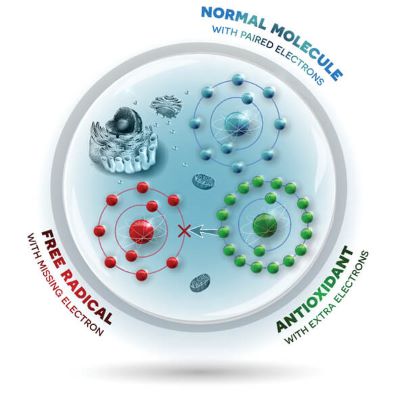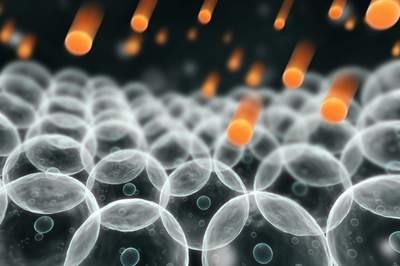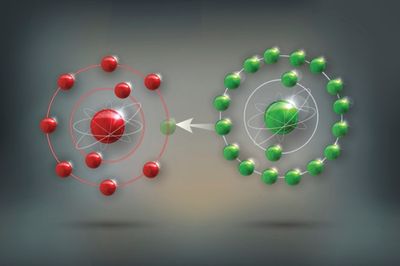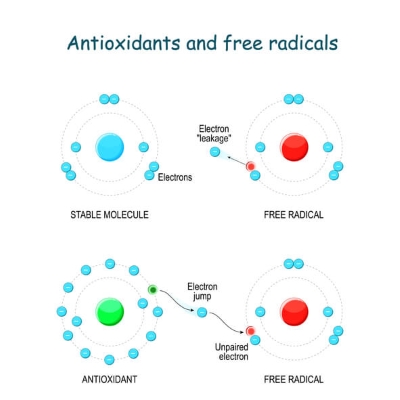Let’s explore the nature of free radicals with a particular focus on whether they can cause premature aging. Find out what you can do to reduce your free radical load, reverse aging, and stay young and active deep into life.
We’ll also discuss the intricate role that human growth hormone (HGH) plays in preventing free radical damage and how hormone replacement therapy (HRT) benefits patients.
 What are free radicals?
What are free radicals?
Mainstream medical outlets generally define free radicals as “free unstable atoms that can damage cells, causing illness and aging.”
Taking a look at the tiny unit of matter, the atom, electrons circle the atom in layers. Free radicals are atoms with at least a single unpaired valence electron. Most free radicals have a high degree of chemical reactivity, which is the reason that they are dangerous to human health.
Several chemical processes can produce free radicals, such as:
- Redox reactions
- Electrical discharges
- Ionizing radiation
- Electrolysis
- Heat
How do free radicals affect the body?
Contrary to popular belief, certain types and quantities of free radicals are necessary for optimal health. So there is significant nuance to consider. Research published in the International Journal of Biomedical Science explains:
“Free radicals and oxidants play a dual role as both toxic and beneficial compounds, since they can be either harmful or helpful to the body. They are produced either from normal cell metabolisms in situ or from external sources (pollution, cigarette smoke, radiation, medication).”
Whether they are beneficial or harmful depends on the type and concentration of free radicals. For instance, nitric oxide (NO) is a free radical that confers numerous health benefits, particularly for heart health:
“Nitric oxide (NO) has led a revolution in physiology and pharmacology research during the last two decades. This labile molecule plays an important role in many functions in the body regulating vasodilatation, blood flow, mitochondrial respiration and platelet function.”
So the goal isn’t to eliminate free radicals. Rather, the name of the game is the management of free radical load and the reduction of harmful free radicals.
Many types of free radicals contribute to the development of chronic illness when oxidative stress rises because the body can’t clear out excess free radicals:
“When an overload of free radicals cannot gradually be destroyed, their accumulation in the body generates a phenomenon called oxidative stress. This process plays a major part in the development of chronic and degenerative illness such as cancer, autoimmune disorders, aging, cataract, rheumatoid arthritis, cardiovascular and neurodegenerative diseases.”
This type of damage contributes to aging, which has been called the “free radical theory of aging.”
What is the free radical theory of aging?
The free radical theory of aging was first introduced into the scientific literature in 1956 by Denham Harman. From the Encyclopedia of Behavioral Medicine:
“The free-radical theory of aging… postulates that the inborn process of aging is caused by cumulative oxidative damage to cells by free radicals produced during aerobic respiration. Free radicals are atoms or molecules with single unpaired electrons. They are unstable and highly reactive, as they attack nearby molecules in order to steal their electrons and gain stability, causing radical chain reactions to occur.”
Essentially, according to the theory, reactive oxygen species (ROS) cause damage to the cells over time, accelerating the natural aging process.
The most notable ROS that negatively affect human health include superoxide ( O2− ), hydrogen peroxide (H2O2), and peroxynitrite (OONO−).
What increases your levels of free radicals?
 Researchers have identified numerous causes of free radical damage. These factors increase free radical load and therefore add to oxidative stress:
Researchers have identified numerous causes of free radical damage. These factors increase free radical load and therefore add to oxidative stress:
- exposure to X-rays
- ozone
- cigarette smoking
- air pollutants
- industrial chemicals
- excessive exercise
- chronic inflammation
- certain medications and/or illicit drugs
- pesticides
Avoiding these triggers of oxidative stress – like quitting smoking, eating organic, and limiting exposure to air pollution – can reduce your free radical load.
Certain foods are known to contribute to free radical buildup, including:
- Processed meats (sausages, bacon, pepperoni, ham, hotdogs, salami, etc.)
- Refined carbohydrates
- Seed oils
With certain lifestyle adjustments, paired potentially with medical interventions like hormone therapy, it’s possible to prevent and reverse free radical damage.
How to protect yourself from free radical damage?
There are several ways to protect yourself from free radical damage to prevent chronic disease and stay young in body, mind, and spirit. The best everyday practices to reduce free radical damage include:
- Limit alcohol intake
- Quit smoking
- Do not reuse cooking oils. Avoid vegetable oils like corn, soy, rapeseed, and sunflower. Instead, use healthier cooking oils like coconut and butter.
- Limit processed foods
- Limit artificial sugar
Supplementation may also confer some benefit for reducing oxidative stress. Popular antioxidant supplements to include in your regimen potentially include lipoic acid, vitamin C resveratrol, coenzyme Q, melatonin, and curcumin.
Curcumin (turmeric) is particularly beneficial as a supplement, because of its powerful antioxidant as well as anti-inflammatory capacity. From research published in Foods medical journal:
“Curcumin has received worldwide attention for its multiple health benefits, which appear to act primarily through its anti-oxidant and anti-inflammatory mechanisms. These benefits are best achieved when curcumin is combined with agents such as piperine, which increase its bioavailability significantly. Research suggests that curcumin can help in the management of oxidative and inflammatory conditions, metabolic syndrome, arthritis, anxiety, and hyperlipidemia.”
Hormone replacement therapy (HRT or sometimes just HT) in patients with hormone imbalances is also excellent for reducing oxidative stress. Research published in the International Journal of Molecular Sciences demonstrates the utility of HRT for this purpose:
“HT improves the lipid and oxidative alterations… supporting the proposal that HT has an antioxidant effect, thus could be used as a complementary treatment option.”
How can HGH help you reverse aging?
HGH is a powerful anti-aging medical intervention in appropriate cases when a patient has been diagnosed with growth hormone deficiency (GHD).
Loss of HGH levels is implicated in the aging process and chronic diseases typically associated with aging. From research published in the World Journal of Men’s Health:
“The age-related decline in GH levels is variously interpreted as a symptom of neuroendocrine aging, as one of causes of altered body composition and other unwelcome symptoms of aging, or as a mechanism of natural protection from cancer and other chronic diseases.”
Conversely, HGH levels elevated into the optimal range is effective as an anti-aging therapy.
Rat studies, which are useful because of the shared physiologically, like this one published in the Journal of Gerontology show that HGH potentially increases lifespan:
“Peripubertal treatment of Lewis dwarf rats with GH results in a significant extension of life span… life span-extending peripubertal GH treatment resulted in increased antioxidant capacity and increased resistance to cellular injury caused by some, but not all, oxidative stressors.”
The benefits of HGH administered through HRT in growth hormone-deficient patients in terms of reducing oxidative stress are evident in the noticeably improved quality of the skin, hair, and nails that occurs within a few months of therapy.
There are also huge anti-aging benefits from HGH replacement therapy going on internally that are not as visible as the improvements to hair, skin, and nail appearance. These include:
- improved metabolism (energy processing and fat burning)
- combatting cognitive decline
- improving mood
- improved cardiovascular (heart) function
- reduced body fat
- increased lean muscle mass
- optimized bone density
The bottom line on free radicals
 If you want to feel younger, look younger, and live longer, do what you can to eliminate free radical damage, including through hormone replacement therapy (HRT) when appropriate.
If you want to feel younger, look younger, and live longer, do what you can to eliminate free radical damage, including through hormone replacement therapy (HRT) when appropriate.
Research into free radicals and their effects on aging is still ongoing. What researchers know for sure is that antioxidants through diet and supplements alone can’t effectively reduce the damage caused by free radicals.
Free radical overload is often an early sign of chronic illness, as the body struggles to maintain homeostasis. Some degree of free radical formation appears to be inevitable, although the mechanisms through which they accumulate in the blood and tissues are not yet fully understood.
Hormone replacement therapy (HRT) with synthetic HGH (somatropin) is proven effective to fight aging and restore mental and physical vitality in individuals with diagnosed hormone deficiencies.


 What are free radicals?
What are free radicals?